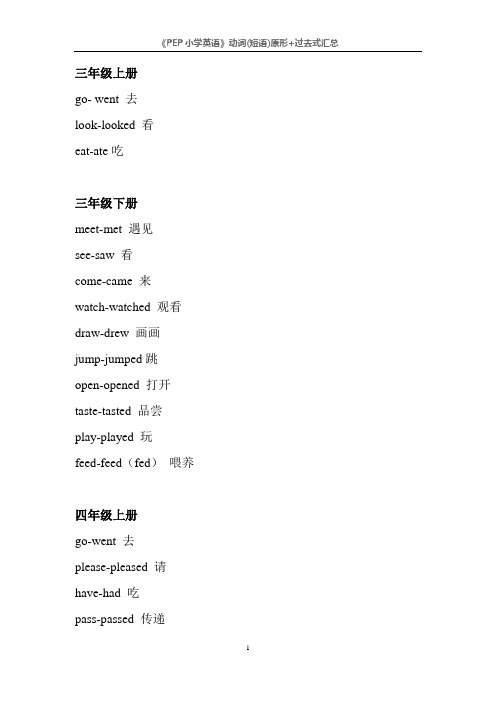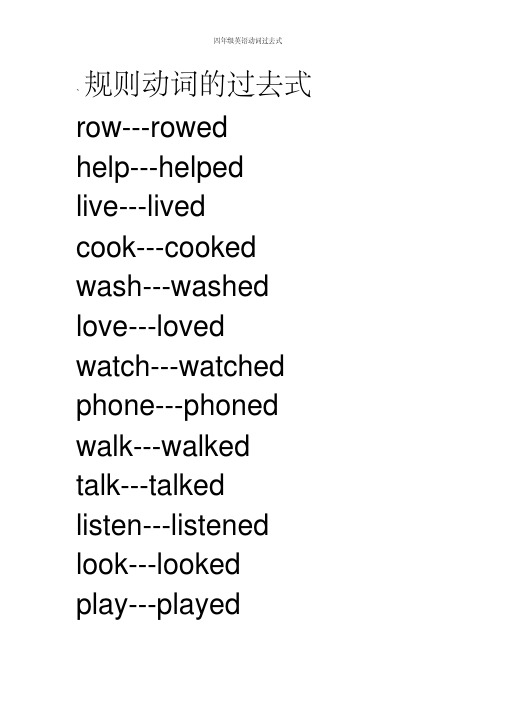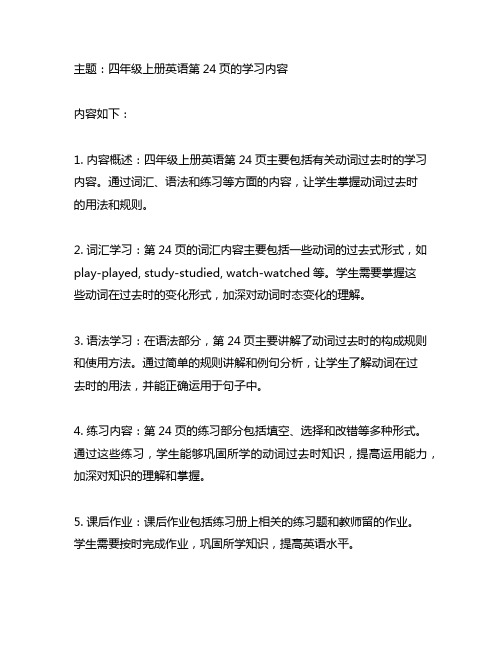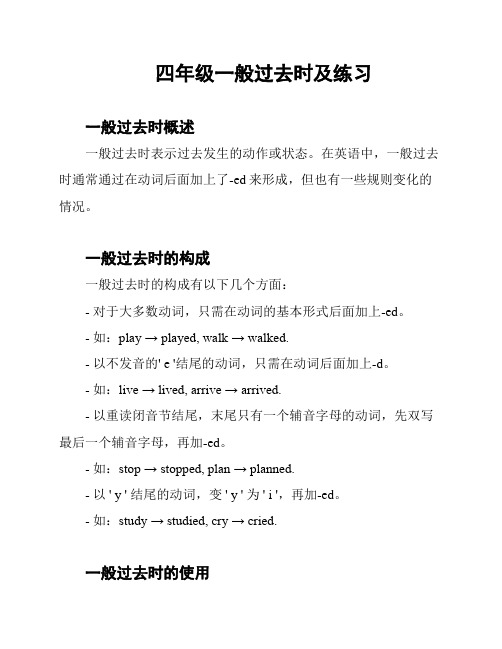四年级上册过去式
四年级上册英语动词分类

四年级上册英语动词分类本文档旨在帮助四年级学生系统地了解和分类英语动词,以便学生在研究和运用英语中能更加准确和自如地使用动词。
下面将动词按照功能和用途进行分类,并提供一些例子以帮助学生更好地理解。
1. 行为动词 (Action Verbs)行为动词用于描述人或物的行为或活动,例如跑 (run)、跳(jump)、读 (read)、写 (write)、游泳 (swim) 等。
以下是一些常见的行为动词:- play (玩)- eat (吃)- sleep (睡觉)- dance (跳舞)- sing (唱歌)- draw (画)- walk (走路)- talk (说话)- watch (观看)- listen (听)2. 状态动词 (State Verbs)状态动词用于表示人或物的状态或存在,例如是 (be)、感觉(feel)、知道 (know)、相信 (believe)、喜欢 (like) 等。
以下是一些常见的状态动词:- be (是)- have (有)- know (知道)- like (喜欢)- want (想要)- need (需要)- believe (相信)- feel (感觉)- love (爱)- hate (讨厌)3. 情态动词 (Modal Verbs)情态动词用于表示一种情态或态度,包括能力、可能性、许可、建议等,例如可以 (can)、应该 (should)、需要 (must)、愿意 (would)、会 (will) 等。
以下是一些常见的情态动词:- can (能)- should (应该)- must (必须)- would (愿意)- will (将会)- may (可能)- might (可能)- could (可以)- shall (将会)- ought to (应该)4. 动词短语 (Phrasal Verbs)动词短语由动词与一个或多个副词或介词组成,具有特定的意义,例如放弃 (give up)、拿起 (pick up)、开始 (start off)、熬夜 (stay up) 等。
外研版四年级上册英语语法总结

外研版四年级上册英语语法总结本文总结了外研版四年级上册英语教材中的语法要点。
1. 一般现在时- 表示经常或惯性的动作或状态。
- 动词原形加-s或-es作为第三人称单数形式。
- 否定句在动词前加do not/does not。
例如:- I usually go to school by bus.- She eats breakfast every morning.- They don't play football on Sundays.2. 一般过去时- 表示过去某个时间发生的动作或存在的状态。
- 动词过去式的变化规则:大多数动词直接加-ed;以不发音的e结尾的动词只加-d;以辅音加y结尾的动词,把y改成i加-ed。
- 否定句在动词前加did not。
例如:- We went to the park last weekend.- She watched a movie yesterday.- They didn't visit their grandparents.3. 现在进行时- 表示现在正在进行的动作。
- 动词be的不同形式(am/is/are)+ 动词ing形式。
例如:- He is playing basketball now.- They are studying English at the moment.- I am not watching TV right now.4. there be句型- 表示某地存在某物或某人。
- 用there is/are + 名词来表示。
例如:- There is a cat in the living room.- There are some books on the table.5. 情态动词can- 表示能力、许可、允许等。
- 用can + 动词原形。
例如:- I can swim very well.- He can't ride a bike.- Can you speak French?以上是外研版四年级上册英语语法的总结。
外研版(一起)小学英语四年级上册单词默写

丢失( lose的过去式)
发现( find的过去式)
钥匙
寻找
Module 8
什么时候
(come的过去式)来
比赛
(win的过去式) 赢,获胜
金制的
奖杯
长笛
练习
(take的过去式)拍摄
看上去......
经常,长时间地
Module 9
发生
从……跌落
骑自行车
渴的
水
西瓜
(carry的过去式)拿;搬
碰,撞
(hurt的过去式)使疼痛,使受伤
膝盖
(cut的过去式)切;割
手指
Module 10
早
每个
在...期间
[geɪmz] 电脑游戏
服(药)
药
许多的
运动,锻炼
健康的
果汁
在...之前
在...之后
厕所
中文解释默写-2
Module 1
dear[dɪə(r)]
well[wel]
of[əv]
soon[su:n]
tell[tel]
love[lʌv]
Module 2
mouse[maʊs]
beside[bɪˈsaɪd]
man[mæn]
Module 5Байду номын сангаас
run[rʌn]
fast[fɑ:st]
sky[skai]
high[hai]
winner['winə]
far[fɑ:]
afraid[ə frei d]
strong[sdrɔŋ]
star[sdɑ:(r)]
Module 6
skirt[skɜ:t]
clean[kliːn]
【英语语法】《PEP小学英语》动词(短语)原形+过去式汇总

三年级上册go- went 去look-looked 看eat-ate吃三年级下册meet-met 遇见see-saw 看come-came 来watch-watched 观看draw-drew 画画jump-jumped跳open-opened 打开taste-tasted 品尝play-played 玩feed-feed(fed)喂养四年级上册go-went 去please-pleased 请have-had 吃pass-passed 传递use-used 使用四年级下册run-run 跑get up-got up 起床go to school-went to school 去学校go home-went home 回家go to bed-went to bed 上床睡觉wear-wore 穿put on-put on 穿上close-closed 关want-wanted想要take-took 买五年级上册know-knew 知道fun-funned 逗笑wait-waited 等待do homework-did homework 写作业watch-TV-watched TV 看电视read books-read books 看书play-computer-did housework 做家务cook the meals-cooked the meals 做饭empty the trash-emptied the flowers 浇花sweep the floor-swept the floor 扫地clean the bedroom-打扫教室wash the windows-washed the windows 擦窗户make the bed-made the bed铺床set the table-set the table 摆饭桌wash the clothes-washed the clothes 洗衣服do the dishes-did the dishes 洗碗碟put away the clothes-put away the clothes收拾衣服play chess-played chess 下棋tell-told 说work-worked 工作use a computer-used a computer 使用计算机have a try-had a try 试一试五年级下册do morning exercises -did morning exercises 晨练eat breakfast-ate breakfast 吃早饭have English class-had English class 上英语课play sports-played sports 进行体育运动eat dinner-ate dinner 吃晚饭climb mountains-climbed mountains 爬山go shopping-went shopping 购物go hiking-went hiking 去远足play the piano-played the piano 弹钢琴visit grandparent-visited grandparent 看望(外)祖父母fly kites-flew kites 放风筝plant trees-planted tress 种树make a snowman-made a snowman 堆雪人swim-swan 游泳skate-skated 滑冰sleep-slept 睡觉draw pictures-drew pictures 画画cook dinner-cooked dinner 做饭read a book-read a book 看书answer the phone-answered the phone 接电话listen to music-listened the music 听音乐clean the room-cleaned the room 打扫房间write a letter-wrote a letter 写信write an e-mail-wrote a letter 写电子邮件fly-flew 飞jump-jumped 跳run-ran 跑climb-climbed 往上爬fight-fought 打架swing-swang 荡秋千take-took 讲话drink water-drank water喝水send-sent 寄take picture-took pictures 照相watch insects-watched insects 观察昆虫pick up leaves-picked up leaves 采摘树叶do an experiment-did an experiment 做实验catch butterflies-caught butterflies 捉蝴蝶count leaves-collected leaves 收集树叶write a report-wrote a report 写报告play chess-played chess下棋六年级上册go to school-went to school 上学stop-stopped 停get to-got to到达find-found 寻找remember-remembered 记住mean-meant 意思是drive-drove 驾驶buy-bought 购买turn-turned 转弯get off-got off 下车ride a bike-rode a bike 骑自行车dive-dived跳水live-lived 居住teach-taught 教go-went 去play the violin-played the violin 拉小提琴make kites-made kites 制作风筝collect stamps-collected stamps 集邮design-designed 设计say-said 说六年级下册Think-thought 思考study-studied 学习kick-kicked 踢bounce-bounced 反弹go swimming-went swimming 游泳go fishing-went fishing 钓鱼study-studied 学习learn-learned 学习sing-sang唱歌dance-danced 跳舞row-rowed 划(船)go skiing-went skiing 去滑雪leave-left 离开hear-heard 听见trip-tripped 旅行have a fever 发烧hurt-hurt 疼痛have a cold-had a cold 伤风have a toothache-had a toothache 牙疼have a headache-had a headache 头疼have a sore throat-had a sore throat 喉咙疼。
外研社一起四年级上册 重点句型+过去式

Module1 Module 9(一)1、She lives in London. 1、What happened to you?2、It was my birthday on Saturday. 2、Sam fell off his bike.3、We were at Buckingham Palace. 3、I fell on the watermelon.4、I’ve got a new friend. 4、I bumped my head.Module 2 Module 101、Yesterday, I cleaned my room. 1、What’s the matter with you?2、I finished my homework. 2、I’ve got a stomach ache.3、Then I helped my mum. 3、What did you eat yesterday?4、Yesterday, Mr Smart cooked noodles. 4、I ate chocolate biscuits.5、Amy painted a picture. 5、Wang Fei’s got a cold.Module 31、She didn’t walk to school yesterday. 写出下列单词的过去式。
2、She didn’t learn these things yesterday. go— are—3、I didn’t play football yesterday.see— is—4、I didn’t ride my bike yesterday. eat— am—Module 4 have— do—1、Chinese people invented paper.buy— cut—2、Chinese people invented printing. wear— win—3、He invented this bicycle in 1839.fall— come—Module 5 hurt— put—1、We went to the Great Wall.learn— run—2、We saw lots of mountains.take— say—3、We ate apples.make— bump—4、You had a good time.5、I wore warm clothes.翻译短语。
四年级英语动词过去式练习30道

四年级英语动词过去式练习30道1. I ______ (go) to the park yesterday. 答案:went 解析:go 的过去式是went,yesterday 是过去的时间,要用过去式。
2. She ______ (eat) an apple last night. 答案:ate 解析:eat 的过去式是ate,last night 表示过去。
3. They ______ (play) football on Sunday. 答案:played 解析:play 的过去式是played,描述过去发生的动作。
4. He ______ (watch) TV yesterday evening. 答案:watched 解析:watch 的过去式是watched,yesterday evening 是过去时间。
5. We ______ (see) a movie last week. 答案:saw 解析:see 的过去式是saw,last week 表明过去的时间。
6. I ______ (play) football with my friends yesterday. 答案:played 解析:yesterday 是过去的时间,play 的过去式是played。
7. We ______ (study) hard for the test last week. 答案:studied 解析:last week 表示过去,study 的过去式是studied。
8. She ______ (dance) beautifully at the school party. 答案:danced 解析:at the school party 表明是过去发生的,dance 的过去式是danced。
9. They ______ (sing) songs happily in the music class. 答案:sang 解析:无明显标志词,但根据语境是过去的动作,sing 的过去式是sang。
外研社英语教材(一年级起点版)四年级上册句型总结

外研社英语教材(一年级起点版)4年级上册句型总结1. 动词过去式① 动词过去式不规则变化:go - went (去), see - saw (看见), take - took (花费;采取), eat - ate (吃), have - had (有), buy - bought (买), fall - fell (掉下、摔倒), is / am - was (是), are - were (是), get - got (得到,抓到), do - did (做), say - said (说), s i ng - s a ng (唱歌), make - made (制作), r i de - r o de (骑), w i n - w o n (赢,胜利), wr i te - wr o te (写), dr i nk - dr a nk (喝), wear - wore (穿), speak - spoke (讲话), break - broke (打破), fly - flew (飞), lose - lost (丢失), find - found (发现), c o me - c a me (来), bec o me - bec a me (变成), run - ran (跑), learn - learnt (学习)不规则变化, - 外研社英语4年级上册(一年级起点版)② 动词过去式直接+ed:wash - washed (清洗),finish - finished (完成), clean - cleaned (打扫), help - helped (帮助), cook - cooked (煮), phone - phoned (打电话), watch - watched (观看), paint - painted (绘画), play - played (玩耍), live - lived (居住), invent - invented (发明), stay - stayed (停留), practise - practised (练习), bump - bumped (碰、撞), happen - happened (发生), climb - climbed (爬)动词过去式直接+ed, - 外研社英语4年级上册(一年级起点版)③ 动词过去式变y为i+ed:carr y - carr i ed(拿走,带走)动词过去式变y为i+ed, - 外研社英语4年级上册(一年级起点版)④ 动词过去式不变:cut - cut (切、割), hurt - hurt (使疼痛,使受伤)动词过去式不变, - 外研社英语4年级上册(一年级起点版)(英语动词过去式的变化大部分是有规律的加"ed",或者改写为"ied",也有不规则变化,不规则的我们见一个积累一个就好。
四年级英语动词过去式

、规则动词的过去式row---rowedhelp---helpedlive---livedcook---cooked wash---washed love---loved watch---watched phone---phoned walk---walked talk---talked listen---listened look---looked play---playeddance---dancedjump---jumpedhop---hoppedstop---stoppedlaugh---laughed bump——bumped不规则动词过去式am—was is—was do—did have—had sing—sang see—saw go—went eat—ate drink—drank take—took make—made fall—fell find—foundcome—came buy—bought carry——carried1、Chinese lesson汉语课2、in the sun 在阳光下3、at home 在家4、in London在伦敦5、big city大城市6、small village小村庄7、what about…怎么样8、wash clothes洗衣服9、watch TV 瞧电视10、listen to music听音乐11、in the park在公园12、have a picnic去野餐13、last Sunday上周天14、by bus坐公交车15 play games 玩游戏16、have a good time玩得开心17、have a busy day度过忙碌的一天18、lots of许多19、make a poster制作海报20、take pictures 照相The west lake 西湖On holiday 在度假last week 上周last year 去年。
外研版英语四年级上册Module6-10重难点知识归纳总结

外研版英语四年级上册Module 6-10Module 6【重点词汇】1.become 变成2.gold 金子3.ago 以前,以往4.long ago 很久以前5.magic 有魔力的6.paintbrush 画笔7.woman 妇女,女性8.became (become的过去式)变成9.real 真实的10.bad 坏的,不好的11.took (take的过去式)拿走12.away 离去,离开13.leaves (leaf的复数形式)树叶14.only 只,仅仅15.painting (一幅)画;绘画作品16.angry 生气的,愤怒的17.said (say的过去式)说【重点句型】1.I had noodles for breakfast yesterday. 昨天早餐我吃了面条。
2.You had fish for breakfast yesterday. 昨天早餐你吃了鱼。
3.No, I didn't have fish for breakfast. 不,我早餐没有吃鱼。
4.This old woman didn't have food. 这个老奶奶没有吃的。
5.It didn't become gold. It became a snake. 它没有变成金子。
它变成了蛇。
6.The bad man didn't have gold. 坏人没有金子。
7.The bad man went to sea in the ship. But he didn't come back.坏人乘着船去了大海。
但是他没有回来了。
Module 7【重点词汇】1.doll 玩偶,玩具娃娃2.matter 事情3.lost (lose的过去式)丢失4.found (find的过去式)发现5.key 钥匙6.look for 寻找【重点句型】1.I lost my hat. 我的帽子丢了。
四年级上册英语第24页的内容

主题:四年级上册英语第24页的学习内容内容如下:1. 内容概述:四年级上册英语第24页主要包括有关动词过去时的学习内容。
通过词汇、语法和练习等方面的内容,让学生掌握动词过去时的用法和规则。
2. 词汇学习:第24页的词汇内容主要包括一些动词的过去式形式,如play-played, study-studied, watch-watched等。
学生需要掌握这些动词在过去时的变化形式,加深对动词时态变化的理解。
3. 语法学习:在语法部分,第24页主要讲解了动词过去时的构成规则和使用方法。
通过简单的规则讲解和例句分析,让学生了解动词在过去时的用法,并能正确运用于句子中。
4. 练习内容:第24页的练习部分包括填空、选择和改错等多种形式。
通过这些练习,学生能够巩固所学的动词过去时知识,提高运用能力,加深对知识的理解和掌握。
5. 课后作业:课后作业包括练习册上相关的练习题和教师留的作业。
学生需要按时完成作业,巩固所学知识,提高英语水平。
6. 学习方法:老师应指导学生采取多种学习方法,如听、说、读、写、练习等,同时鼓励学生多加练习,多积累词汇,提高英语学习兴趣和能力。
7. 总结:通过四年级上册英语第24页的学习,学生能够初步掌握动词过去时的基本用法和规则,并能在实际交流中正确运用。
这对学生的英语学习打下了坚实的基础,也为以后的学习奠定了良好的基础。
以上就是四年级上册英语第24页的学习内容的相关介绍,希望对您有所帮助。
在四年级上册英语第24页的学习内容中,动词过去时的学习对学生的英语学习起着重要作用。
动词过去时是英语语法中基础的一个部分,学生需要在这个阶段扎实掌握。
通过学习动词过去时,学生可以增强对过去事件描述的能力,拓展句子构造的灵活性,提升英语语言表达的准确性。
继续深入学习动词过去时,学生需要了解一些不规则动词的过去式。
这些不规则动词的过去式与动词原形的规则变化不同,需要学生通过大量的练习来记忆和掌握。
教师可以设计各种形式的练习题,鼓励学生多加练习,比如填空、选择、造句等,让学生能够在实践中更好地掌握这些不规则动词的过去式形式。
四年级一般过去时及练习

四年级一般过去时及练习一般过去时概述一般过去时表示过去发生的动作或状态。
在英语中,一般过去时通常通过在动词后面加上了-ed来形成,但也有一些规则变化的情况。
一般过去时的构成一般过去时的构成有以下几个方面:- 对于大多数动词,只需在动词的基本形式后面加上-ed。
- 如:play → played, walk → walked.- 以不发音的' e '结尾的动词,只需在动词后面加上-d。
- 如:live → lived, arrive → arrived.- 以重读闭音节结尾,末尾只有一个辅音字母的动词,先双写最后一个辅音字母,再加-ed。
- 如:stop → stopped, plan → planned.- 以 ' y ' 结尾的动词,变 ' y ' 为 ' i ',再加-ed。
- 如:study → studied, cry → cried.一般过去时的使用一般过去时常用于以下情况:- 过去发生的动作。
- 过去存在的状态。
- 过去的经验或惯。
- 过去的真相或常识。
一般过去时练下面是一些练,帮助你加强对一般过去时的理解和应用。
1. 选择正确的动词形式填空:- Yesterday, I (play / played) soccer with my friends.- They (stay / stayed) at a hotel during their vacation.- She (watch / watched) a movie last night.- We (visit / visited) the museum yesterday.2. 根据提供的动词,填写正确的一般过去时形式:- go: ____________- eat: ____________- do: ___________- see: ___________3. 改写下列句子,使用一般过去时:- I play basketball every weekend. (改写成一般过去时)小结一般过去时是表示过去发生的动作或状态的一种时态。
外研版一年级起点小学英语四年级上册四会单词及句子

lose丢失lost(lose过去式)
lookfor寻找
doll玩偶,玩具娃娃
matter事情
key钥匙
DidyoutakeAmy’sdoll你拿了Amy的娃娃吗?
Didyouseeit你看见它了吗?
Yes,Idid.是的,我看见了。
No,Ididn’t.不,我没看见。
magic有魔力的
paintbrush画笔
real真实的
1.Thisoldwomandidn’thavefood.这位老人没有食物。
2.Itdidn’tbecomegold它没有变成金子。
3.Itbecameasnake.它变成了一条蛇。
4.Hedidn’tcomeback.他没有再回来。
Module7
2.WewereatBuckinghamPalace.我们在白金汉宫。
3.Wheredoesshelive?她居住在哪?
4.ShelivesinLondon.她住在伦敦。
5.I’vegotanewfriend.我有一个新朋友。
Module2
skirt裙子
clean打扫,清理cleaned(clean过去式)
Module8
when什么时候
come来came(come过去式)
win赢,获胜won(win过去式)
look看上去…
take拍摄took(take过去式)
competition比赛
practise练习
English英国的,英国人,英语
flute长笛
gold金制的
alot经常,长时间地
1.Whendidtheycome?他们什么时间来的?
2.Chinesepeopleinventedprinting.中国人发明了印刷术。
最新湘少版英语四年级上册知识点归纳汇总

Unit 1★动词过去式变化规律:1. 一般情况下,直接在动词词尾加ed. 如:talk—talked说listen—listened听play—played玩climb—climbed爬2. 以不发音的e结尾,在动词词尾加d. 如:practise—practised练习3. 以辅音字母加y结尾的动词,变y为i再加ed. 如:study—studied学习,研究4. 以一个辅音字母结尾的重读闭音节词,双写最后一个辅音字母,再加ed. 如:stop—stopped停止5. 不规则动词没有规律,需要特殊记。
如:do-did have—had go—went learn—learnt take—took read—read speak—spoketeach—taught stand—stood sit—sat say—said run—ranis, am—was are—were write—wrote★单词、短语during 在…期间holiday 假期learn words and sentences学习单词和句子play games玩游戏learn writing学习写作practice listening练习听力★句子时态:一般过去时,表示过去某个时间里发生的动作或存在的状态。
主要由动词的过去式来体现,其标志词是过去的时间。
如:yesterday昨天last night昨晚last week上周last year 去年等等。
1. What did you do during the holidays? 假期间你做了什么?—I read many books./ I learnt writing. / I wrote a little storybook in English./ I visited my grandparents.Unit 2★单词、短语weekday工作日after在…之后before在..之前always总是,经常often时常sometimes有时never从不wave goodbye挥手再见be late for school上学迟到read a newspaper读报纸play chess下棋take a walk散步get up起床have/has breakfast吃早餐return home回家★句子时态:一般现在时:表示经常,反复发生的动作或存在的状态。
